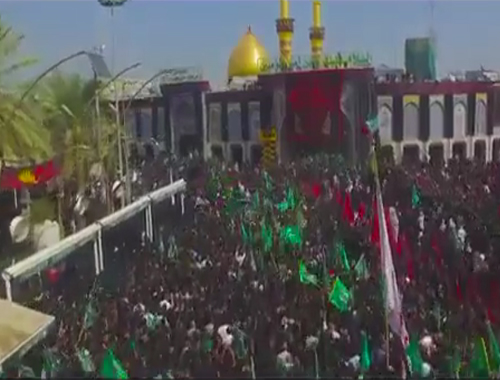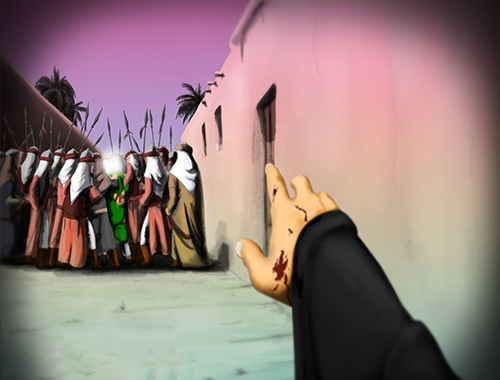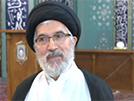Letter 74
- Details
- Hits: 2940
Letter 74
I Explaining Why We Reject her Hadith,
II Reason Confirms the Will,
III Her Claim that the Prophet Died on Her Chest is Refuted.
Safar 14, 1330
1) You have, may Allah assist you, insisted that I should elaborate, and you have left me no option except doing just that. Due to the wealth of your knowledge, you know where we come from. Here lies the fountainhead of the will; here lies the battle-ground of explicit texts; here lies the annihilation of the khums, inheritance, and creed; here lies the cause of sedition; here lies the reason of discord; here lies the root of dissension...[1] While fighting the Commander of the Faithful, she toured the lands, leading a huge army in order to usurp his government and put an end to his rule.
What happened has happened; I am no narrator of that;
So have good thoughts, and do not ask who, when or what.
To argue in support of denying the will to `Ali using her own statement, the most bitter of his enemies that she was, is an attempt not expected at all from any fair¬minded person. And that was not the only incident that demonstrated her animosity towards `Ali (as). Denying the will to `Ali is much less significant than the Lesser Camel Battle[2] and the Greater Camel Battle in which evil intentions surfaced and the curtain removed. Likewise, her attitude was manifest even before going out to fight him, the man who was her own wali, and her Prophet's wasi, till the news of his death reached her, whereupon she prostrated to thank God (for his martyrdom) and composed these lines:[3]
She laid down her rod, happy and pleased,
Her heart joyful, her mind eased;
As a traveller arrives home, of burdens relieved;
Never say `Ayesha, by Ali's death, was grieved.
If you desire, I may quote for you of her hadith what proves to you that she was in remote error. She has said: "When the Messenger of Allah, peace be upon him and his progeny, became seriously sick, he went out dragging his feet, reclining on two persons; one of them was `Abbas ibn `Abdul¬Muttalib and another man."[4] The narrator of this hadith comments adding: "I informed `Abdullah ibn `Abbas about what `Ayesha had said, and he responded to me saying, `Do you know the name of the man whom `Ayesha did not name?' I said: `no.' Ibn `Abbas said: `He was `Ali ibn Abu Talib.'" The narrator continues to say that `Ayesha does not wish `Ali any good.[5]
If she did not wish any good to a man with whom the Messenger of Allah, peace be upon him and his progeny, walked, how could she then be expected to feel good about mentioning the will which contains a great deal of good for `Ali? On page 113, Vol. 6, of his Musnad, Imam Ahmed quotes `Ata' ibn Yasar saying: "A man came and spoke ill of both `Ali and `Ammar to `Ayesha who responded by saying, `As regarding `Ali, I have nothing to say to defend him; but concerning `Ammar, I have heard the Messenger of Allah, peace be upon him and his progeny, say that whenever `Ammar had to opt between two options, he always chose the most reasonable of them.'"
Have you noticed that?! The mother of the believers warns about plotting against `Ammar due to the saying of the Messenger of Allah, peace be upon him and his progeny, "Whenever `Ammar had to opt between two options, he always chose the most reasonable of them," while refraining from warning against plotting to harm `Ali who is the brother and successor of the Prophet, his Aaron and confidant, the most just among his nation, the foremost to believe in his message, the one whose merits are the most...! As if she is not aware of his status in the eyes of Allah, the Exalted and Mighty, or his position in the heart of the Messenger of Allah, peace be upon him and his progeny, or his status in Islam, his great efforts for its promotion, and his handsome contributions. As if she never heard anything in the Book of Allah nor the Sunnah of His Messenger (pbuh) in his praise, so that she would place him at par with `Ammar!
By Allah, my mind is perplexed when I consider her statement: "I have seen the Prophet (pbuh), while on my chest, ordering a wash-bowl to be brought to him; I hardly noticed how fast he collapsed and died; so, how could he have made a will to `Ali?" I do not know which aspect of her statement I should criticize, being scrutinized as a whole from various angles. I wonder how anyone can presume that since his death took place the way she described, he could not have left a will. Did she think that a will is valid only at the time of death?! No, but it is the excuse of one who is fighting the irrefutable truth, whoever he or she may be, while Allah has said in His Glorious Book, addressing His revered Messenger (pbuh), "It is prescribed unto you when death approaches someone to leave something good, a will (Qur'an, 2:180 and 5:106)." Did the mother of the believers ever see him, peace be upon him and his progeny, going against the instructions of the Book of Allah or ignoring its injunctions? God forbid. She saw him following its guidance, adhering to its verses, rushing to obey its bidding and forbidding, reaching the ultimate end of adherence to all its injunctions. There is no doubt in my mind that she must have heard him saying: "No believer who knows that he is leaving something behind him should sleep even two nights without having his will written,"[6] or something in this meaning, for his instructions regarding the writing of wills have undoubtedly come from him. It does not fit him or any other Prophet, blessings of Allah be upon all of them, to bid something without doing it himself, or forbid something while doing the opposite thereof; Allah is above selecting such individuals for conveying His message.
As regarding what Muslim and others have quoted `Ayesha saying: "The Messenger of Allah (pbuh) left neither a dinar nor a dirham, neither a male nor a female camel, nor did he leave any will," it is just like its previous "hadith." Yet it is not correct to assume that what she meant was that he (pbuh) did not leave any will at all, but rather that he did not have possessions which required a will, for, indeed, he did not leave much of this world's wares, the most ascetic person that he was. He joined his Lord, the Exalted and the Sublime, leaving a few outstanding debts,[7] and a few items, in addition to things entrusted to him by other people which required a will [regarding who they belonged to. He also left of his own possessions something that would help defray his debts, and the fulfillment of his promises, with a remnant that required being handed over to his heir. The proof for that is what Fatima al¬Zahra', peace be upon her, rightfully demanded of her father's inheritance.[8]
2) The Messenger of Allah, peace be upon him and his progeny, left things which demanded a will, things which no other human being ever left. Suffices you that he left the upright religion of Allah, while still at the beginning of its growth and early inception, and that by itself demanded an heir more than did gold or silver, a house or a real estate, lands or cattle. The entire nation became his orphans and widows, seeking refuge with his successor to take his place to fare with them and manage their religious and secular affairs. It is impossible that the Messenger of Allah, peace be upon him and his progeny, should have entrusted Allah's religion, while still in its cradle, to inclinations and presumptions, or left the protection of its legislation to personal motives and interests, without a successor to look after religious as well as secular affairs, someone upon whom he could rely to represent him before the public. He is above leaving his orphans, who inhabited spacious lands, like frightened cattle in a rainy winter night, without anyone to look after them. He is above abandoning the will especially after having received instructions in its regard from his Lord and thus strongly commanded his nation to do so. Reason does not listen to the claim that no will was made, even if such a claim comes from a highly respected person.
At the dawn of the Islamic era, the Messenger of Allah, peace be upon him and his progeny, made a will to `Ali (as) even before his mission was publicized in Mecca, immediately following the revelation of the verse saying: "And warn your near kin (26:214)," as we explained in Letter 20. He continued repeating his will time and over again, emphasizing it through many covenants to which we had referred. When he finally wished, while in his last hours, may I sacrifice my parents for his own sake, to write his will to `Ali (as) to emphasize his previous verbal covenants, and to back his previous verbal statements in this regard, he, peace be upon him and his progeny, said: "Bring me some writing material so that I may write for you something to protect you against straying," but they disputed, while no dispute is permitted in the presence of a Prophet, and said: "The Messenger of Allah (pbuh) is delirious."[9] It was then that he (pbuh) realized, after they had made such a statement, that no trace would remain of his intended order, if implemented, other than dissension; therefore, he told them to clear his room, feeling satisfied with the verbal covenants which he had made to `Ali (as).
In spite of all this, however, he made three recommendations at the time of his death: that they should select `Ali as his successor; that they should turn the polytheists out of the Arabian peninsula; and that they should reward the envoys in the same way he (pbuh) used to reward them. But the dictates of politics at that time did not permit the traditionists to narrate his first will, claiming that they had forgotten it. Al¬Bukhari, at the conclusion of the hadith containing the charge that the Messenger of Allah (pbuh) was delirious, said verbatim: "And his (pbuh) will at the time of his death contained three instructions: to turn the polytheists out of the Arabian peninsula, to reward the envoys in the same way which he used to reward them..., and the third one was forgotten."[10] This is how Muslim puts it in his Sahih, and so do all other authors of sunan and musnads.
3) The claim of the mothers of believers that the Messenger of Allah, peace be upon him and his progeny, joined his Lord while being on her chest is opposed by the authenticated tradition stating that he (pbuh) joined the Supreme Companion while being on the chest of his brother and friend (wali) `Ali ibn Abu Talib (as), according to all consecutively reported sahihs from the Imams of the purified progeny which are supported by Sunni sahihs, as is well¬known to researchers, Wassalam.
Sincerely,
Sh
-----------------------------------
[1] This agrees with Sunni books of traditions; so, refer to al-Bukhari's Sahih, his chapter on the households of the Prophet's wives, his treatise on holy wars and traditions, page 125, Vol. 2, and you will find the details.
[2] The dissension of the Lesser Camel Battle took place in Basra five days before the end of Rabi`ul-Thani, 36 A.H., before the arrival of the Commander of the Faithful (as) there, when the city was attacked by the mother of believers [`Ayesha] accompanied by Talhah and al-Zubayr. `Ali's governor of Basra then was `Uthman ibn Hanif al-Ansari. Forty supporters of `Ali (as) were killed at its mosque, and seventy others elsewhere. `Uthman ibn Hanif, who was one of the most respectful sahabah, was taken captive, and his captors wanted to kill him but feared revenge from his brother Suhayl and the rest of the Ansar; so, they shaved his beard, moustache, eyebrows, and head; they beat him, imprisoned him, then they expelled him from Basra. They were fought by Hakim ibn Jablah, with a group of his tribe `Abd Qays, of whom he was chief. Hakim was a man of wisdom, discretion, and prestige, and he was followed by a group of Banu Rabi`a who refused to cease fighting till each and every one of them was martyrded, including Hakim, in addition to his most honourable son, his brave brother, and Basra fell in the hands of the invading army. When `Ali (as) came, he had to face `Ayesha's army, and so did the Greater Camel Battle take place. The details of both battles are preserved in books of history written by Ibn Jarir, Ibn al-Athir, and in many others.
[3] As quoted by trustworthy chroniclers such as Abul-Faraj al-Asfahani at the conclusion of his discussion of `Ali in his book Maqatil al-Talibiyyin.
[4] As quoted by al-Bukhari about her in his section on the Prophet's (pbuh) sickness and demise, page 62, Vol. 3, of his Sahih.
[5] This statement in particular, i.e. Ibn `Abbas saying that `Ayesha does not wish him any good, is left out by al-Bukhari who stops his quotation at its preceding statements, following his customary habit in such situations, but many authors of books of tradition have quoted it through their authentic reporters. Consider what Ibn Sa`d records on page 29, Section Two, Vol. 2, of his Tabaqat, where he cites a chain of narrators including Ahmed ibn al-Hajjaj, `Abdullah ibn Mubarak, Younus, Mu`ammar, al-Zuhri, `Ubaydullah ibn Atbah ibn Mas`ud, whose sources end with Ibn `Abbas. Reporters of this hadith are considered trustworthy according to the consensus of scholars.
[6] As quoted by al-Bukhari at the beginning of his treatise on wills in his Sahih, page 83, Vol. 2. It is also quoted by Muslim in his section on the record of the [Prophet's] will, page 10, Vol. 2, of his Sahih.
[7] Mu`ammar quotes Qatadah saying that `Ali (as) had taken care, on behalf of the Prophet (pbuh), of certain matters after his demise, most of which was a debt estimated at five hundred thousand dirhams; so, refer to this hadith on page 60, Vol. 4, of Kanz al-`Ummal, and it is hadith number 1170 among the ones which he narrates.
[8] As quoted by al-Bukhari at the and of his chapter on Khaybar's campaign in his Sahih, page 37, Vol. 2.
[9] This is quoted verbatim by Muhammad ibn Isma`il al-Bukhari in his section on generosity towards envoys in his book Al-Jihad wal-Siyar, page 118, Vol. 2, of his Sahih.
[10] Refer to it in the chapter dealing with rewarding the emissaries on page 118, Vol. 2, of Al-Jihad wal-Siyar.











